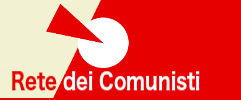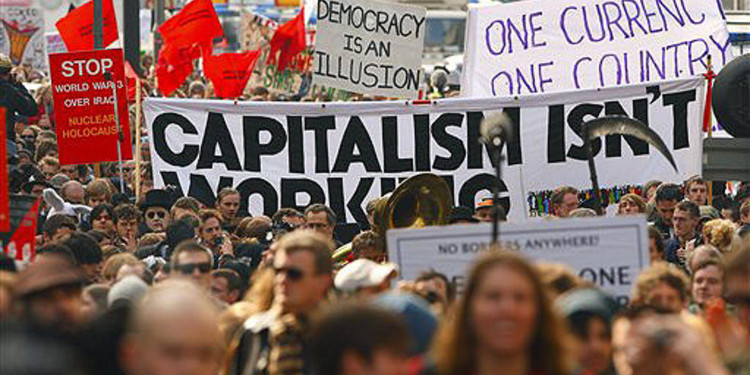| english | italiano |
Mauro Casadio – Rete dei Comunisti
Surely, until recently we would not have expected to see what the current health crisis triggered by the Coronavirus is showing to us, that is that China, and especially Cuba, would send humanitarian aid to our country.
Any bad thing that could be said about communist-oriented countries, even if in an economic relation with the Western world like China, has been said: from the absence of any kind of democracy to misery as permanent condition of those people. Now, instead “the emperor has no clothes” and we find that to be exposed to ferocious social misery are the people of imperialist countries.
What is happening is certainly not an accident, but the manifestation of an historical impasse – with no exaggeration – of the capitalist mode of production. From the end of URSS, the so-called ‘growth’ was possible by employing the open spaces left from that crisis and by reversing all the advances made by the working class movement in the XX century, starting from the systematic destruction of Welfare state as a real vengeance of capital against subaltern classes.
Now those ‘margins’ have been eroded and the crisis manifest itself paradoxically where we thought there would be no problems, that is in the backyard of the countries who thought they would dictate the destiny of humanity.
In historical terms, thirty years are a length of time where, generally, changes take place and the contradictions of a certain social and developmental model emerge. Now, even though we were in a stagnating phase of the international political dynamics, these contradictions are emerging in another unexpected front, and risk to question the current stasis in the world power relations.
In fact, the enemy which was considered destroyed, which has been mocked for decades from the Western intellectual elites, starting from the Italian ones, now re-emerges, not as the ‘storm of the Winter Palace’, but as a concrete alternative to a financial and economic system which can live only by cannibalising its own social dimension, causing deep troubles.
This is evident if one looks at the destruction of all national healthcare systems in favour of private actors and financial speculation through healthcare funds
Indeed, those countries which still define themselves as communist, which are not an irrelevant part of the world, show that they can tackle with collective spirit and determination emergencies such as the ones which the imperialist countries cannot face, because they have to homage private economic and financial interests.
While we do not have to recreate any myth on a socialist homeland, as it was one with the USSR, it is evident that the revolutionary process which started a century ago in Russia did not exhaust its propulsive thrust.
While this process certainly changed modes and forms under the constraints set by reality, and it was taken with different approaches in different countries, it continues to operate and to present itself as an alternative at strategic crossroads such as the one we are experience now.
This strategic crossroad – which is like the one of the 1990s in terms of dimension, but with an opposite political sign – is the one which is confirming clearly some Marxian point of views on the trajectory of capital.
Firstly, that capital is a sorcerer’s apprentice, which evokes forces which then is not able to manage. In concrete terms, the infamous ‘globalisation’ – mondialisation in Marxist terms – cannot be run according to the logic of private profit, as it reproduces conflict and competition, transforming the potentiality for development in negative elements, which are against the general interest of humanity.
The characteristics of the present are: the destruction of the welfare state which was achieved through class conflict in XX century; pauperization of subaltern social classes in terms of income and social condition; devastation of the environment to use it to produce profit, destroying the natural condition for reproduction of the humanity.
Together with this material regression are falling also the ideological narratives which have accompanied us throughout this decades and which acquired credibility among people.
We have been told that we needed less State and more market, and the other fairy tale about the end of History, as the last horizon for humanity could only be the one of capital.
What is happening now dismantle this ideological scheme and gives us other lessons.
The first of these lessons is that the State is not necessarily that Moloch which oppresses the people but can be also an instrument of emancipation against any logic which as its basis in the boundless individualism, in the war of everyone against everyone. Today, this vision contrasts with reality, which shows how, in a complex society such as the one in which it was historically determined, individualism is a dangerous poison for the collective interest.
Secondly, the ‘free’ market is a falsehood which is convenient for dominant classes, and that it is emerging the necessity of planning as an instrument for balanced growth of a developed society, which today is still characterised by the logic of profit which capital imposes as inescapable condition of its permanence.
What we want to point out here is that we are not before the affirmation of communism of the XXI century, the road is certainly more complex and will be subject to further changes and crossroads, even dramatic ones, which were never lacking at historical crossroads. What we can say is that we are observing a turnaround, the affirmation of an objective necessity, which puts history in the right direction.
Those who in these decades held their position with determination, did not draw back on a conception of the world, did not give in to the enticements of power, continued to work in the society even during a phase of radical mutation, now can claim with pride of being a communist, and can continue to work towards the perspective of social change; not because not it is easier to do so, but because change today is more credible.
This perspective for the ‘Rete dei Comunisti’ includes also breaking with the European Union and constructing an Euro Mediterranean area which links our future with those countries which are against the current imperialist development.
This is a position which we support since long, which seemed to be unrealistic, but which now unexpectedly finds confirmation in the systemic crisis, in its current form of a health crisis, and in the role which the communist-led country are assuming within this dramatic global phase.
Rete dei Comunisti

